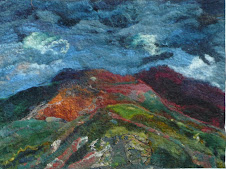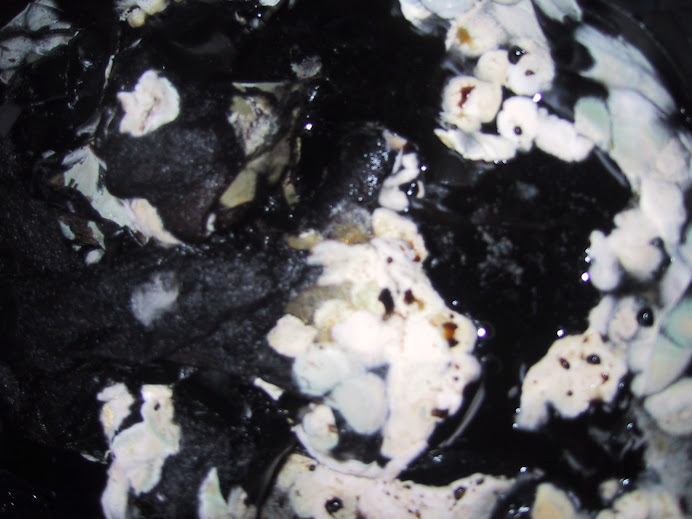
Yesterday I went over to Enys's house and she carefully pruned her nurtured and much cared for indigofera plant. Enys loves this plant; she says it is partly because it folds it's leaves up every night, but it is also because getting it to germinate proved challenging and growing it even with a greenhouse has been difficult. Now, however, she has got the hang of it and there are two other seedlings coming along nicely on her kitchen windowsill. It germinates in the greenhouse but seems happier in the kitchen and as she has an Aga the temperature probably stays fairly even. This is a plant that has been really looked after just as if it was baby which explains why she won't let me near it with her pruning shears and her DH ,an expert gardener, was drawn into a discussion on how much to cut off without endangering the plant.
The leaves weighed 100g, 76g after I had stripped them off the stalks. I ripped them up and put them in an 1 litre pot with a lid and placed them in a larger pan. I covered them with water and placing in a double boiler and heated till 60 degrees C
There was very little colour in the little vat so I left it overnight as a member from Natural Dyes Online had suggested. This morning ( Sunday) I had a look at it and it was still barely more than pale yellow so I chopped the leaves more finely and reheated in the double boiler and repeated to about 80 degrees C. The water was now murky yellow green , but I put 1 teaspoon of washing soda and had a pH of 9.8: too high I wonder whether the washing soda which is a new batch is unusually strong, and whisked till it was very frothy. The froth was quite white . By this time I was becoming convinced that there was no indigotin at all, but I added 1/2 teaspoon of thiourea dioxide to the vat and left it for ten minutes and put in a few strands of throwsters waste, which looked white as it went in rather than yellow. Now I was convinced that there was nothing there and was wondering how to tell Enys that her precious plant had produced nothing. when I pulled out the silk. To my astonishment the edge of the silk turned a turquoise blue. I tried re dipping and finally I got a pale blue silk and a pale turquoise blue 10 g piece of wool. I am a bit surprised how turquoise they look and felt the result has been more like the colour obtained by dyeing with persicaria (polygonum) tinctoria.

So there was not much indigotin there but some and I feel very pleased to have tried as I have now successfully used all the four plants that we grow and that will give blue. I wonder whether the lack of sun has been a factor but it is more probably that it is a tropical plant growing in conditions which are far from ideal for it. Well I will try again next year provided of course Enys lets me.



























Helen, I feel with Enys - I tried to grow indigo a few years ago and it is really difficult in our climate! I had three seedlings - 2 of which died off after a few weeks. the last one grew extremely slow (inside of course!) and died when my unheated glasshouse went below the 10 deg.C in winter:(( I didn't bother again as it doesn't seem feasible here - in contrast to the polygonum. but I admire your tenacity of trying all the indigo plants:) and the colour is quite nice!
ReplyDeleteHi well Enys's plant took 3 year to get that big so really it has been more for interest. For some of that time it was in friends conservatory. No it is really not designed to grow here. I wonder whether the National Botanic Garden of Wales could be persuaded to grwo it in the tropical section?
ReplyDeletegive it a try and ask? the can't do more than refuse.... unfortunately our botanic gardens in dublin are too far away for me, so I have to make do without. good thing that indigo is available in extracted form!
ReplyDeleteHaving spent the summer using my plants to dye blue I am very glad we can buy indigo! To try and even do as much indigo dyeing as I do with plant grown here in the garden would be impossible. Beside there is no two ways about it the blue from Indigofera Tinctoria is much stronger than anything else. But it does make one appreciate it very much.
ReplyDelete